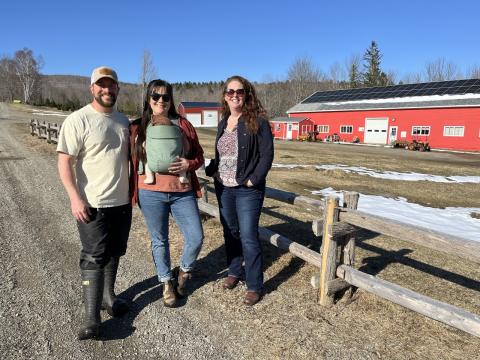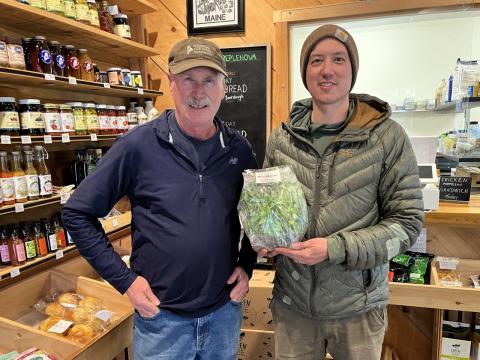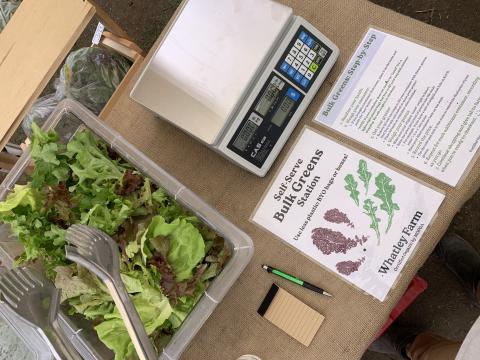Earth Day is Monday, April 22, 2024
Bangor, April 20, 2024 –Earth Day is a global event that has been recognized each April since 1970. USDA Rural Development Maine State Director Rhiannon Hampson toured several Maine farms to honor the occasion this year. The farms, all participants in USDA’s Rural Energy for America Program (REAP), utilize a variety of strategies to reduce their use of fossil fuels and petroleum products. Using biodegradable materials, reducing single-use plastics, packaging in compostable containers, and tapping into renewable energy are among the tactics used. Maine farms play an important role in mitigating climate change, modeling sustainable practices, and shortening the supply chain for residents.
“Fighting climate change and creating economic prosperity go hand in hand,” said Director Hampson while visiting a Newburgh farm earlier this month. “As a farmer myself, I know how much small, consistent steps matter, such as limiting single-use plastics or transitioning to LED lighting. Some businesses can make even bigger adjustments, like converting to solar power or electric-powered equipment. We recognize these changes require time, work, and financial investment, and I applaud all the farmers making this commitment.”
In the lead-up to Earth Day, Director Hampson visited farms to learn about their earth-friendly practices. At Newburgh’s Nettie Fox Farm, co-owners Molly Crouse and Everett Ottinger take a holistic approach to sustainability. Although they can’t eliminate all petroleum-based products from the certified organic vegetable farm, they aim to minimize the farm’s carbon footprint. The couple converted their home to heat pumps, replaced their propane stove with induction, purchased an electric vehicle, and have plans to acquire an electric tractor. Their propagation greenhouse is carbon neutral, heated by passive solar collection and electric resistant heat. They have begun to transition the entire farm to rely on clean energy, installing an 14kW roof-mounted solar array on their barn in 2021 (partially funded by a REAP grant and financing from Five County Credit Union) and plan to increase their solar capacity in the future.

Just a few miles away at Piper Mountain Christmas Tree Farm, co-owners Molly Livingston and Jesse Jimerson have been modernizing the farm they purchased two years ago. They were accepted into the Maine Organic Farmers and Gardeners Association's Journeyperson program and began adopting more sustainable practices for the operation, including:
- Working to improve the farm’s soil health using cover crops and other methods.
- Moving away from Styrofoam products, eliminating foam cups from their cider and donut stand and foregoing floral foam. (The farm now uses biodegradable Agrawool in its holiday arrangements.)
- Replacing much of the lighting with energy-efficient LED bulbs.
- Transitioning the farm to solar power. With a USDA REAP grant to cover some of the project costs and financing from Coastal Enterprises Inc., they began the switch to solar power in 2023. The farm now is almost entirely run on solar, offsetting almost 19K pounds of coal per year.

This year’s Earth Day theme is “Planet vs. Plastics,” with organizers emphasizing the need “to build a plastic-free world” using innovative technologies and materials. Such materials are front and center at Replenova Farm, an organic vegetable farm in Durham. Founder Gary Goodrich has used compostable, plant-based packaging exclusively since opening the farm’s year-round farm store and commercial kitchen in 2019. The farm’s organic mixed vegetables and value-added foods all are packaged in biobased materials. The business also relies on clean energy, with solar panels on the barn roof (partially paid for with a REAP grant) providing at least 80% of the energy needed to run the farm including the store and fully electric kitchen.
Consumers can also play an active role in reducing the prevalence of single-use plastics. Whatley Farm in Topsham tries to make this an easy option for its customers. Farmers’ markets regularly offer bulk produce, but even there salad greens are often pre-packaged in bags. In 2022 Whatley Farm began offering bulk salad greens at its markets, allowing shoppers to use tongs to place greens in their own containers. This practice hasn’t eliminated plastic from the Whatley market display but enables customers to choose to bring their own bags and not bring home any new plastics. In terms of energy use, the farm’s greenhouses and cold storage have been solar-powered since 2017 when the farm secured a REAP grant that helped pay for roof-mounted solar panels.
“The farms we visited all took the major step of converting to solar power,” said Director Hampson following the site visits. “But each of them has adopted multiple approaches to protect the environment and the climate. It’s a good reminder that we can all make a difference if we pay attention to the small things too. And while using climate-smart strategies can be good for the bottom line, at root it benefits all Mainers as we combat climate change.”
About the farms:
- Nettie Fox Farm, 2348 Kennebec Rd. in Newburgh, is currently accepting signups for a 13-week vegetable CSA available to pick up in Newburgh and drop-off locations in Bangor. (Sign up online on the farm’s website: https://www.nettiefoxfarm.com/.) They attend the Bangor Farmers' Market beginning in April or May, Sundays from 11-1:30 on Harlow St. across from the Bangor Public Library. Select produce can be found seasonally at the Natural Living Center in Bangor.
“Our guiding notion from the start was generating clean power on-site, making loan payments to pay for the solar equipment (and eventually for energy storage) instead of a power bill and putting gas in a car. Environmentally, we try to give back more than we take, but this was also a good business decision and a win-win for the farm.” -Molly Crouse and Everett Ottinger, co-owners of Nettie Fox Farm.
- Piper Mountain Christmas Tree Farm, 27 Trundy Road in Newburgh, is open seasonally, offering Christmas trees, wreaths, arrangements, gift packages, and more. Learn more online at https://pipermtn.com/
“Transitioning to solar was the largest project for us to tackle on our list of goals we had for our first few years of owning the farm, but the most important. Getting away from fossil fuels and investing in the future of both the business and environment is a personal belief we wanted our business to reflect, and our customers love it too.” Molly Livingston, co-owner of Piper Mountain Christmas Tree Farm

- Whatley Farm, 3 Whatley Farm Rd. in Topsham, will be opening its greenhouse for organic seedling sales in May. The farm also sells at farmers’ markets year-round. The last Brunswick Winter Market is Saturday, April 27th and our outdoor markets start in May: the Brunswick Farmers Market Tuesday/Friday starts May 3rd, and the Brunswick-Topsham Land Trust Farmers Market starts May 4th. Learn more online at http://whatleyfarm.com/.
"Farming can also be an energy-intensive business, and solar is one of the best ways we can generate our own electricity to run all the necessary elements of a resilient farm: greenhouses, cold storage, and value-added processing. I would also say that it is important for us to do what we can to make our operation have a positive impact on the world, and it there's one thing the world doesn't need more of, it's single-use plastics. This has led us to try and reduce them on our farm and in our packaging. I would estimate that we have saved over 10,000 bags since we started offering bulk greens in 2021." -Ben Whatley, co-owner of Whatley Farm
- Replenova Farm, 1252 Royalsborough Rd. in Durham, features a year-round farm store including coolers, a freezer, and a commercial kitchen. The store offers organic vegetables as well as prepared and ready-to-eat foods made on-site. Also available are meats, dairy items, baked goods, beverages, and other artisanal food products from local producers. Learn more online at https://replenova.com/.
“Using solar energy is a big step towards making a farm financially sustainable. Without that, the other aspects of sustainability don’t matter. It can be especially important for smaller farms.” Gary Goodrich, owner of Replenova Farm.
###
USDA is an equal opportunity provider, employer, and lender.
